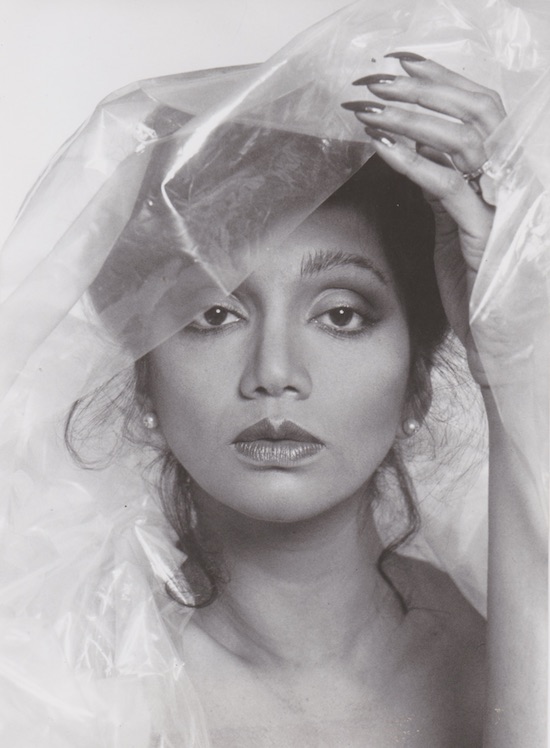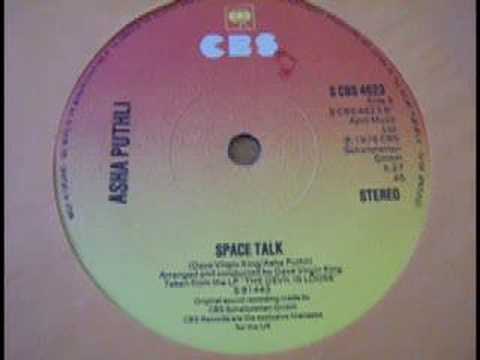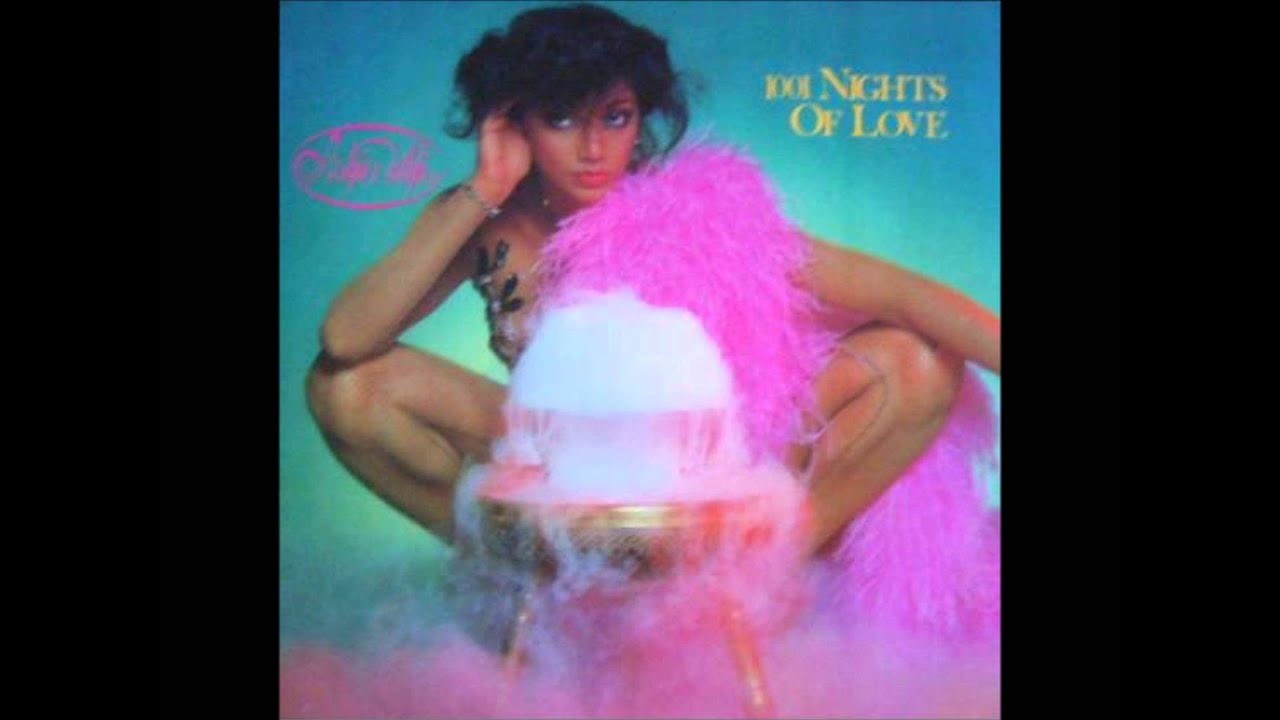Asha Puthli is one of the headline acts at Le Guess Who? festival Utrecht, NL, appearing on Sunday 10 November
When it comes to cross-cultural fusion, Asha Puthli is a shining exemplar. Born in Mumbai, growing up she studied classical music from both India and Europe, while listening to jazz from the States on the radio. Puthli told the New York Times back in 2006 that she had been training to be an opera singer as a young woman, before she discovered that pursuing such a career would mean not being able to use any other singing styles, in order to preserve her voice – accordingly, she decided that particular medium would restrain her from doing what she felt compelled to do as an artist.
Though her vocals certainly still retain the formidable power an opera background might suggest, her instinct was to make music that blended sounds and stylings from her home country with the American music she loved. It’s something she succeeded at: Asha’s music largely sits somewhere in the space of cosmic disco, jazz, glam and soul, though it melds in reminders of her Indian classical background too – most notably, when she slips into those wispy, high-pitched vocals that are gorgeously sinuous.
Her career started out singing in Mumbai’s jazz clubs, where she improvised with what would become a signature blend of jazz and Indian classical-style vocals within the same songs. She also had a small role in a Merchant-Ivory film, and trained in Indian classical dancing (Bharatnatyam and Kathak). It was the latter skill which would take her to New York on a scholarship in 1969, to the prestigious Martha Graham contemporary dance company. During her time in NYC, she was able to establish herself in the forward-thinking arts scene there, discovered by renowned talent scout John Hammond, working with Ornette Coleman on his 1971 album Science Fiction and performing at Studio 54 (she was also photographed by, and with, Andy Warhol).
Europe was where she would find the most acclaim for her music, however. It was via CBS Records in the UK that she recorded and released her 1973 self-titled debut album with Elton John producer, Del Newman.
Over the years, Puthli’s work has been used in tracks by hip hop artists, electronic producers, and even in grime beats (Kano sampled her cover of George Harrison’s ‘I Dig Love’ on his 2005 Diplo-produced track, ‘Reload It’).
Evidently, her influence is far-ranging – but her artistry is vast too. Though she’s perhaps best known for the glam, galactic proto-disco of her early work, or the softer, soulful jazzy tracks with glossy harps and strings, she’s also delved into rock and dance music, as well as soundtrack work.
Ahead of her performance at Le Guess Who? festival, Asha Puthli selected ten notable moments from her back catalogue for us, which we’ve unpacked and placed into the context of her strange, beautiful and expansive world.
‘Space Talk’ (1976)
“It’s had a life of its own,” Asha says of this, perhaps her best known song. Taken from her album The Devil Is Loose, ‘Space Talk’ opens with a cinematic choir, before cosmic chimes and a lithe bass line enter; these are soon topped with her distinctly luxe, silky vocals that channel the sweet and soft high register of trained Indian female vocals. A galactic disco bop, it’s had what she describes as “an organic kind of evolution”, wherein it has been sampled in several hip hop songs – most famously in P. Diddy and Notorious BIG’s ‘The World Is Filled’, on Life After Death, Biggie’s posthumous album. It’s also been sampled by the Pharcyde and G-Unit.
‘Peek-A-Boo Boogie’ (1979)
Taken from the album 1001 Nights Of Love, this is one of Asha’s favourites, she says, because it was written with her son. “[It’s from] when I had to balance being a single mom and a songwriter with an album deadline,” she explains, “The song was written while playing hide and seek with him, [so it was] interactive songwriting – multitasking. Women are good at multitasking.” Rather than literally being about playing “peek-a-boo” with a young child, however, the track uses the motif to reprimand a romantic interest who isn’t paying her enough attention. Over the strut of sumptuous glam-disco guitars, she sings, “Now I see you, now I don’t/ let me dance with you alone, I want you for my own.”
’The Devil Is Loose’ – television performance (1977)
The beguiling and expansive title track from her 1976 album, this is full of glossy, symphonic strings and serene but striking vocals. ‘The Devil Is Loose’ was Asha’s first gold single in Europe, and she credits it for expanding her audience from jazz into the mainstream. This performance took place on Starparade, a West German music chart show known for its live orchestra. Watching her here feels like a revelatory insight into one side of her artistry, as she sways, draped in her seraphic white dress, while singing with that uniquely captivating voice that here is at once formidable and potently fluid.
‘I’m Gonna Kill it Tonight’ (1980)
Asha describes this as part of her lesser-known “rock phase” – disco was disappearing from fashionable music spheres, and so she put out an album that was also called I’m Gonna Kill It Tonight. It’s a much more propulsive and intense affair overall, although there’s certainly a sparkling glam edge to this ostensibly new wave track which is still consistent with some of her earlier releases. Rather than dealing in smouldering spiritualism or talk of the cosmos, this era was grounded in socio-political commentary, tackling issues concerning gender as well as the environment. Indeed, she says this punchy title track is from a group of songs written on the victimisation of women.
‘Hey Diwani Hey Diwana’ (2001)
This is taken from a collaboration with the Dum Dum Project, an “East-West” fusion group devised by New York-based producer Sean Dinsmore in the 90s. Though it’s got some of the spiritual energy of Goa Trance, this is more lively and lush (for context, one of the Dum Dum Project’s tracks, ‘Air India’, became an Ibiza hit). The improvised Hindi vocals on this are Asha – she picked it because it shows her range and her relevance in fusion songs into the 21st century, even in entirely different genres.
‘Say Yes’ (1976)
Also taken from The Devil Is Loose LP, Asha picked this one for how it subtly makes reference to an Indian context that might slip past some ears. Though on the surface it sounds like a soaring, devotional love song, when she sings, “I would walk through fire just to tell you say yes”, for example, she notes that it’s a reference to the now-banned practice of “sati.” This was a ritual found among Hindus, wherein widows were historically expected to sacrifice themselves by sitting atop of their deceased husband’s funeral pyre and burning with them – a practice which certainly reframes lines like “I want you so badly I would die”. She also mentions the double-entendres relating to Hindu religious ascetics, sadhus – when she compares the sensation of "needles in my body" to a caress, it’s a reference to the ritual of piercings that some sadhus undertake.
Ornette Coleman – ‘What Reason Could I Give’ (1971)
During her time in 1970s New York, talent scout John Hammond (who famously signed Bob Dylan), discovered Asha. He sent her audition tape to free jazz pioneer Ornette Coleman, and it would result in Asha becoming the featured vocalist on his album Science Fiction, with her impossibly smooth, whimsical but rich singing foregrounded on two tracks. Asha says this release is a significant one as it was her first US jazz release, but also because her work on the album saw her voted as a joint winner in prestigious American jazz magazine Downbeat‘s critics’ poll for best female vocalist that year. There’s something almost psych-tinged about this particular track, which finds her refraining lines like, “How many times must I die for love?”, over a skittering, urgent beat and melodic yet wailing instrumentation.
‘The Whip’ (1979)
Asha chose this because it’s the first time she composed, co-produced and recorded music for a film – an Italian movie which she also acted in. This is from Squadra Anti-Gangster, directed by Bruno Corbucci, in which Asha plays an Interpol Officer who goes undercover as the singer/girlfriend of a mobster, who ends up capturing the gang with her whip (in this clip, she’s dancing around with said whip while singing her spangly disco song). She made three songs for the feature – including the opening credits and end credits of the film.
‘L’hymne À L’amour’ (2009)
This is from Asha’s most recent album, 2009’s Lost, which she recorded in Monte Carlo for Italian label Kyrone. The track she’s chosen is the final song on the album – a decidedly spooky cover of the Edith Piaf song. There’s something a little uncanny valley about the instrumentation – after tracks with live orchestras, the synthesised strings and woodwind sound quite surreal here, particularly when it crackles into a swirling haunted house crescendo that seems to nod to ‘Being For The Benefit Of Mr. Kite!’ Still, it’s a choice that reflects Puthli’s powerful, yearning jazz heritage and how she pushes that forward into new spaces – be that the use of new technologies or crafting new strange and distinctive arrangements. It also shows how, through the years, her voice remains strikingly smooth.
‘Right Down Here’ (1973)
The final song Asha wanted to highlight from her career takes us back to the start – this is the opening track of her debut Asha Puthli album. A J.J. Cale cover, it’s all breathy, nonchalant, sultry vocals over smooth Hammond organ and punchy brass. Asha says she’s chosen it because it was sampled in the German hip hop group Die Fantastischen Vier’s major hit ‘Die- Da ?!’ – every song that has inspired something, or been sampled further down the line is “the best compliment you can give an artist,” she says. And certainly, there’s been a lot of those compliments in her career, through her various guises. Asha Puthli might not be a household name, but her pioneering spirit and ambition has carried her through generations, crafting fusions, yes, but also – as with this particular track – just creating very beautiful, timeless music that resonates around the world.
Asha Puthli is one of the headline acts at Le Guess Who? festival Utrecht, NL, appearing on Sunday 10 November




